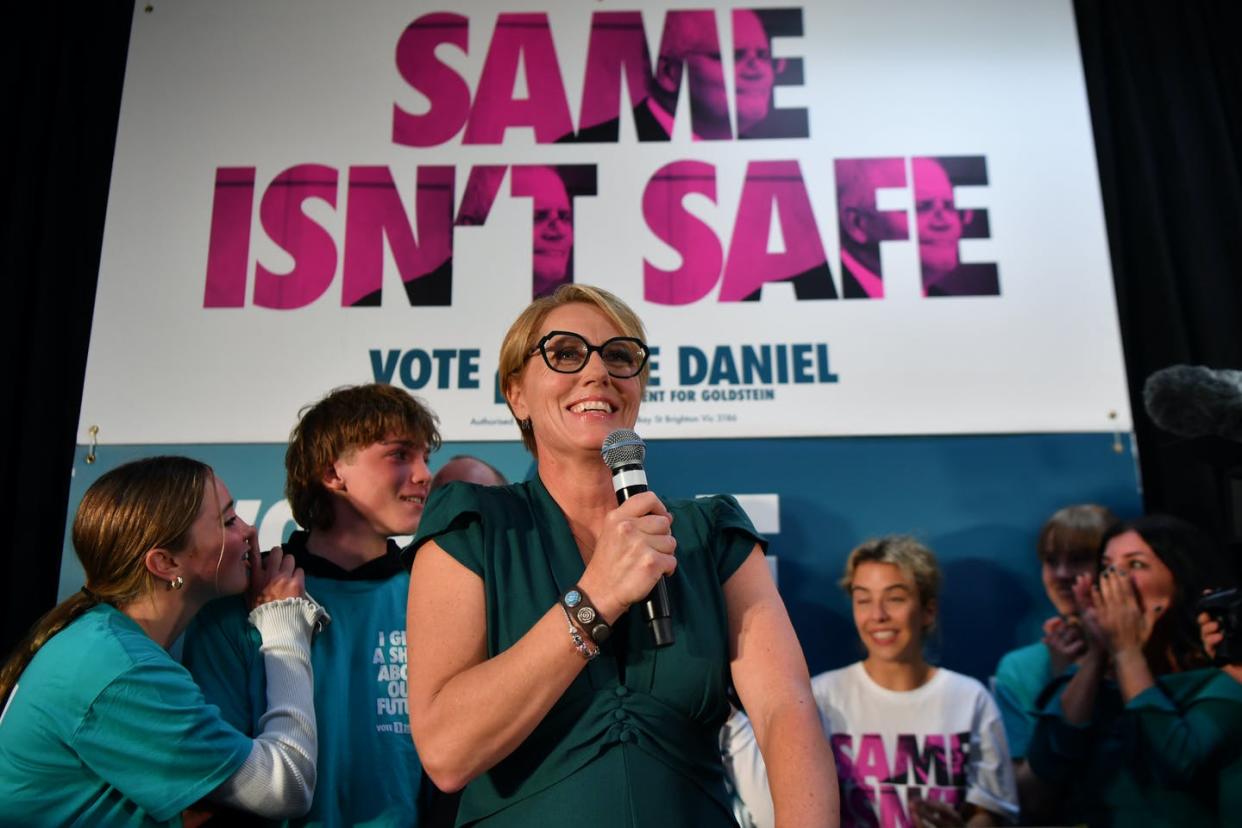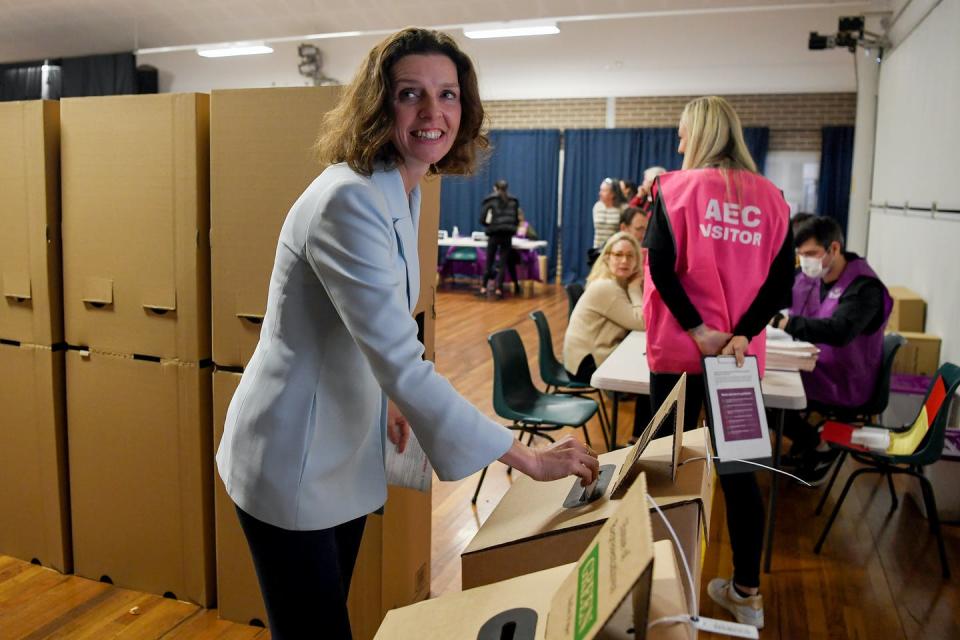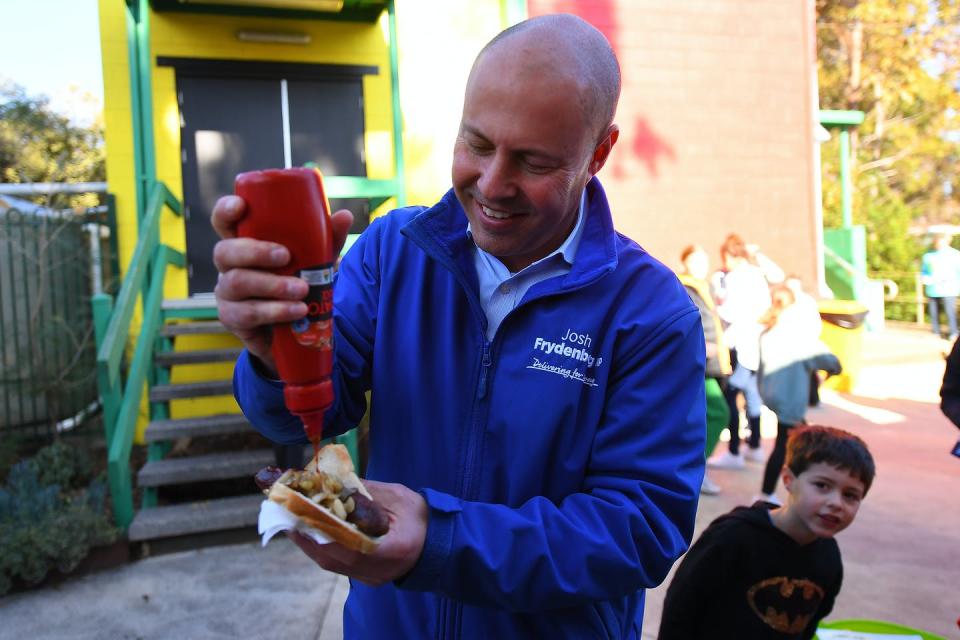The big teal steal: independent candidates rock the Liberal vote

One of the most stunning features of the 2022 election has been the challenge from teal independents in Liberal seats.
At the close of counting on Saturday, the teal independents have polled much stronger than expected, and look to have succeeded in electing a swathe of new independents to the House of Representatives. As Liberal Party commentator Tony Barry told the ABC, “the Liberals have lost their base”. It was not a blood bath, but a “teal bath”.
The headline story is the success of neurologist Monique Ryan who looks poised to take the blue-ribbon seat of Kooyong from Treasurer Josh Frydenberg. But teal candidates have stormed other electorates in Melbourne, Sydney, Perth and Canberra.
Read more: Why teal independents are seeking Liberal voters and spooking Liberal MPs
The teal wave
When we are talking about “teals” we are talking about the 23 independent candidates, most of them women, who have challenged traditionally Liberal-held seats or Senate spots. All have received support from fundraising organisation Climate 200.

Climate 200 convener Simon Holmes a Court credited the success, particularly in inner Melbourne, to a huge volunteer effort. “This community independents movement is incredible,” he told the ABC.
The results so far
Counting is still continuing and it needs to be noted that high numbers of postal and pre-poll votes will favour the major parties. So we will need to watch some of these seats in coming days before the results are confirmed.
ABC election analyst Antony Green has already given:
North Sydney to independent Kylea Tink, defeating Liberal MP Trent Zimmerman
Mackellar to GP Sophie Scamps, defeating Liberal MP Jason Falinski
Goldstein to with former ABC journalist Zoe Daniel, defeating Liberal MP Tim Wilson.
Along with Kooyong, business leader Allegra Spender was ahead of Liberal MP Dave Sharma in Wentworth.
Independents Kate Chaney in Perth’s Curtin and Rob Priestly in regional Victoria’s Nicholls were also putting up a huge fight as counting closed on Saturday. Caz Heise in Cowper in northern NSW was also recording a strong independent vote.
Other independents with Climate 200 backing were also comfortably re-elected: Zali Steggall in Warringah, Helen Haines in Indi, Andrew Wilkie in Clark and Centre Alliance MP Rebekha Sharkie in Mayo.
Taking into account the likely election of Dai Le – a non-Climate 200 independent candidate against Labor’s Kristina Keneally in Sydney’s Fowler – the independent numbers on the cross bench could double in size.
In the Senate, teal candidate David Pocock is in a close race for the second ACT Senate spot, with Liberal incumbent Zed Seselja.
What does this mean?
These results far exceed expectations before polling day. Noting the very strong results for the Greens, particularly in Queensland, we have seen an extremely clear vote for more action on climate change, more integrity in politics and more action on gender equity. These were all central planks of their campaigns.
Voters who would normally have voted for a moderate Liberal, but would have been unlikely to vote Labor or Greens, were given a viable choice – and they took it with both hands.

In an election full of different results and surprises, this block of independents is going to markedly change the composition of the lower house. The precise nature of their role and power will be determined when we know if Labor will rule in a majority or minority.
These results also mean that the Liberal Party has been stripped of its moderate MPs. Minister for Finance Simon Birmingham lamented the loss of his colleague Zimmerman on Saturday night, saying the party would have to “make up for the absence of those [moderate] voices”.
Birmingham also blamed the “contagion effect” of Katherine Deves’ controversial candidacy in the neighbouring seat of Warringah, arguing this has turned potential Liberal voters in other seats. It might well be argued that Deves had a similarly adverse effect on the campaigns in other long-held Liberal seats on the North Shore and surrounds, such as Mackellar and Bennelong.
Read more: How the Liberals lost the 'moral middle class' - and now the teal independents may well cash in
But of course these results reflect something much more serious and much deeper than a preselection problem.
What should follow now is a period of soul-searching within the party, and a decision on how it will challenge these seats in the future. Where will be party’s base lie in the future?
Meanwhile a new crop of MPs have given “politics as usual” a huge shock.
From the beginnings of Cathy McGowan’s victory in Indi in 2013, we now have an established model for community-backed candidates to win seats in parliament. The teals will have a steep learning curve in Canberra (without the infrastructure of established parties to support them) but they have already made a difference.
We should expect to see similar challenges in both Labor and Liberal seats in elections to come. The Australian political system is well and truly on notice.
This article is republished from The Conversation is the world's leading publisher of research-based news and analysis. A unique collaboration between academics and journalists. It was written by: Amy Nethery, Deakin University.
Read more:
What now for the Liberal Party? A radical shift and a lot of soul-searching
Climate change: the IPCC has served its purpose, so do we still need it?
Amy Nethery does not work for, consult, own shares in or receive funding from any company or organisation that would benefit from this article, and has disclosed no relevant affiliations beyond their academic appointment.


